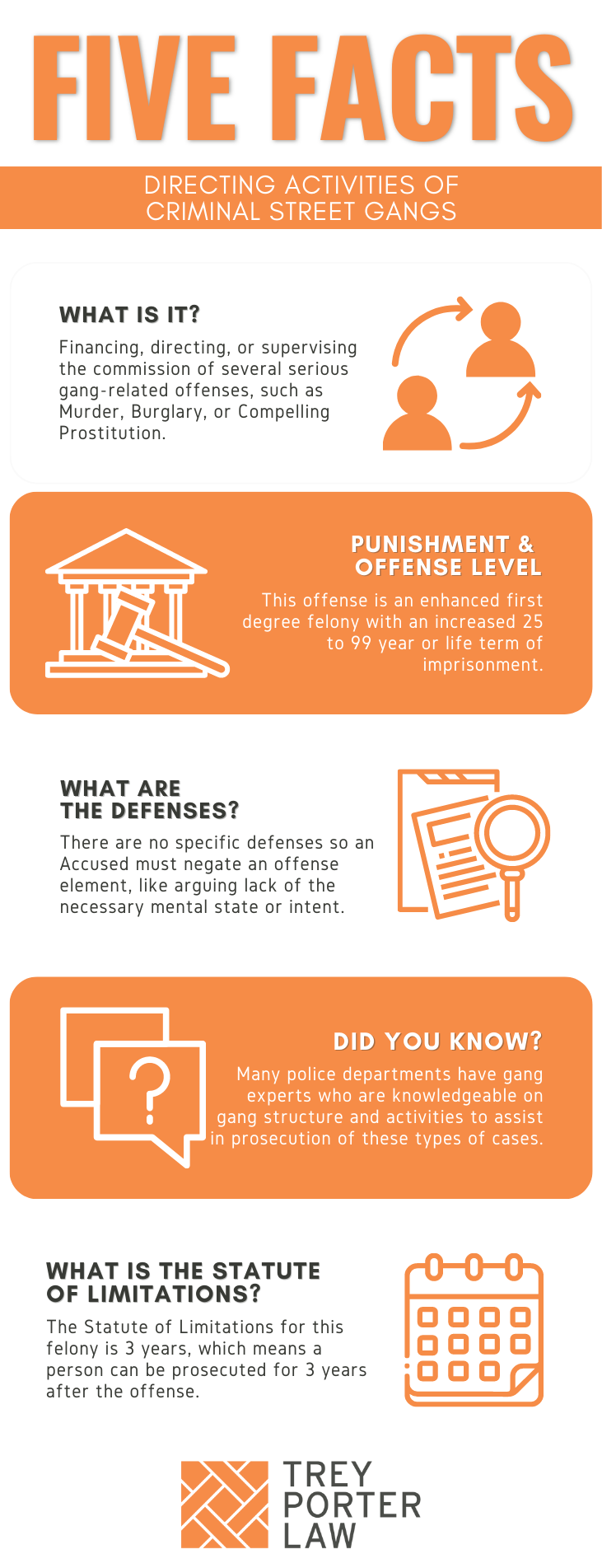WHAT IS DIRECTING ACTIVITIES OF CRIMINAL STREET GANGS IN TEXAS?
The Texas law against directing activities of criminal street gangs prohibits financing, directing, conspiring to commit, or supervising the commission of a serious felony offense, including murder, capital murder, aggravated robbery, burglary, kidnapping, sexual assault, manufacturing or delivering a controlled substance, aggravated promotion of prostitution, or compelling prostitution as an identifiable leader of a criminal street gang.

- What is a criminal street gang? Texas Penal Code Section 71.01 defines a criminal street gang as three or more persons having a common identifying sign or symbol or an identifiable leadership who continuously or regularly associate in the commission of criminal activities.
WHAT IS THE DIRECTING ACTIVITIES OF CRIMINAL STREET GANGS LAW IN TEXAS?
Tex. Penal Code § 71.023. DIRECTING ACTIVITIES OF CRIMINAL STREET GANGS.
(a) A person commits an offense if the person, as part of the identifiable leadership of a criminal street gang, knowingly finances, directs, or supervises the commission of, or a conspiracy to commit, one or more of the following offenses by members of a criminal street gang:
(1) a felony offense that is listed in Article 42A.054(a), Code of Criminal Procedure;
(2) a felony offense for which it is shown that a deadly weapon was used or exhibited during the commission of the offense or during immediate flight from the commission of the offense; or
(3) an offense that is punishable under Section 481.112(e) or (f), 481.1121(b)(4), 481.1123(d), (e), or (f), 481.115(f), or 481.120(b)(6), Health and Safety Code.
(b) An offense under this section is a felony of the first degree punishable by imprisonment in the Texas Department of Criminal Justice for life or for any term of not more than 99 years or less than 25 years.
WHAT IS THE PENALTY CLASS FOR DIRECTING ACTIVITIES OF CRIMINAL STREET GANGS IN TEXAS?
Directing activities of a criminal street gang is a first degree felony with an increased minimum punishment of 25 years in prison, and a maximum of 99 years or life.
WHAT IS THE PUNISHMENT RANGE FOR DIRECTING ACTIVITIES OF CRIMINAL STREET GANGS IN TEXAS?
The punishment range for directing activities of a criminal street gang, a first degree felony, is 25 to 99 years of life in prison, and a maximum $10,000 fine.
WHAT ARE THE PENALTIES FOR DIRECTING ACTIVITIES OF CRIMINAL STREET GANGS IN TEXAS?
A person charged with directing activities of a criminal street gang is not eligible for probation or deferred adjudication, as the minimum prison sentence is 25 years.
- What is parole eligibility for directing activities of a criminal street gang in Texas? Pursuant to Texas Government Code Section 508.145, people convicted of directing activities of a criminal street gang must serve the lesser of half their prison sentence, or 30 years before becoming parole-eligible.
WHAT ARE THE DEFENSES TO DIRECTING ACTIVITIES OF CRIMINAL STREET GANGS IN TEXAS?
The statute does not authorize specific defenses to directing activities of criminal street gangs. A person accused thereof may attempt to negate at least one of the elements the State must prove at trial.
WHAT IS THE STATUTE OF LIMITATIONS FOR DIRECTING ACTIVITIES OF CRIMINAL STREET GANGS IN TEXAS?
The limitation period for directing activities of criminal street gangs is three years.
DIRECTING ACTIVITIES OF CRIMINAL STREET GANGS IN TEXAS
The Texas law against directing activities of criminal street gangs enhances the punishment for gang leaders, or anyone acting in a leadership role in further of a criminal street gang’s activities, to a minimum prison sentence of 25 years, and a maximum of 99 to life in order to deter the proliferation of gang activity.
TEXAS DIRECTING ACTIVITIES OF CRIMINAL STREET GANGS COURT CASES
The case law regarding directing activities of criminal street gangs in Texas illustrates how circumstantial evidence supports a conviction.
- In Malbrough v. State, the defendant was convicted of directing activities of a criminal street gang after orchestrating and financing of five aggravated robberies committed by several people in a two-month period. He chose the target locations, assigned tasks, instructed his co-defendants how to commit the robberies, conducted countersurveillance, drove them there, acted as a lookout, sold the stolen electronics, and paid the individuals. The appellate court affirmed his conviction for his leadership role in financing, directing, or supervising the aggravated robberies committed by members of a criminal street gang.
















